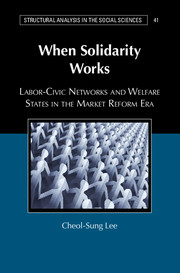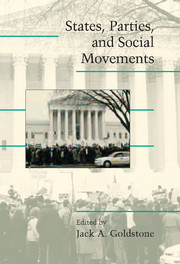When Solidarity Works
Labor-Civic Networks and Welfare States in the Market Reform Era
$135.00 (C)
Part of Structural Analysis in the Social Sciences
- Author: Cheol-Sung Lee, University of Chicago
- Date Published: October 2016
- availability: Available
- format: Hardback
- isbn: 9781107174047
$
135.00
(C)
Hardback
Other available formats:
Paperback, eBook
Looking for an examination copy?
This title is not currently available for examination. However, if you are interested in the title for your course we can consider offering an examination copy. To register your interest please contact [email protected] providing details of the course you are teaching.
-
Why do some labor movements successfully defend the welfare state even under the pressures of neo-liberal market reform? Why do some unions (and their allied parties and civic associations) succeed in building more universal and comprehensive social policy regimes, while others fail to do so? In this innovative work, Cheol-Sung Lee explores these conundrums through a comparative historical analysis of four countries: Argentina, Brazil, South Korea and Taiwan. He introduces the notion of 'embedded cohesiveness' in order to develop an explanatory model in which labor-civic solidarity and union-political party alliance jointly account for outcomes of welfare state retrenchment as well as welfare state expansion. Lee's exploration of the critical roles of civil society and social movement processes in shaping democratic governance and public policies make this ideal for academic researchers and graduate students in comparative politics, political sociology and network analysis.
Read more- Provides rich sources of interview and network data based on a network-driven, actor-centered framework
- Reveals a historical process in which labor-civic solidarity evolves around specific social policies allowing readers to understand the evolving processes of organizational solidarity for collective actions toward the social provision of welfare
- Proposes a new theory of the development and retrenchment of the welfare states in developing countries
Reviews & endorsements
'One of the book’s strengths is its direct engagement with and combination of literatures on both social movements and welfare state development. The former offers an understanding of the importance of organizational structure in enacting social change, and the latter contributes a comparative framework for understanding variation in welfare state regimes.' Mikaela Smith, Mobilization
Customer reviews
Not yet reviewed
Be the first to review
Review was not posted due to profanity
×Product details
- Date Published: October 2016
- format: Hardback
- isbn: 9781107174047
- length: 432 pages
- dimensions: 235 x 152 x 28 mm
- weight: 0.72kg
- contains: 29 b/w illus. 23 tables
- availability: Available
Table of Contents
List of figures
List of tables
Preface
Abbreviations
Part I:
1. Introduction
2. Revisiting the theories of welfare states in developing countries
3. Theoretical discussion: the structures of associational networks and labor politics
Part II:
4. The origin of top-down solidarity in South Korea
5. Embeddedness, cohesiveness, and the politics of social policy expansion in South Korea: universal vs. selective reforms
6. The survival and decline of embeddedness under retrenchment drives: the politics of retrenchment under market reforms: Part III:
7. Comparative case studies I: market-orientated reforms of welfare states and union responses in Argentina and Brazil
8. Comparative case studies II: market-orientated reforms of welfare states and union responses in South Korea and Taiwan
9. Comparative case studies III: associational networks and welfare states in Argentina, Brazil, South Korea and Taiwan
10. Conclusion
Appendix A. Interviewee profiles
Appendix B. Measurement of associational networks
Appendix C. Game theoretical models
Appendix D. Supplementary analyses: the structure of South Korean civic networks in the 2000s
Appendix E. Generalization: findings from the cross-national quantitative analyses
Bibliography
Index.
Sorry, this resource is locked
Please register or sign in to request access. If you are having problems accessing these resources please email [email protected]
Register Sign in» Proceed
You are now leaving the Cambridge University Press website. Your eBook purchase and download will be completed by our partner www.ebooks.com. Please see the permission section of the www.ebooks.com catalogue page for details of the print & copy limits on our eBooks.
Continue ×Are you sure you want to delete your account?
This cannot be undone.
Thank you for your feedback which will help us improve our service.
If you requested a response, we will make sure to get back to you shortly.
×





